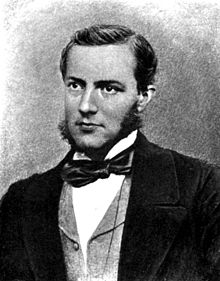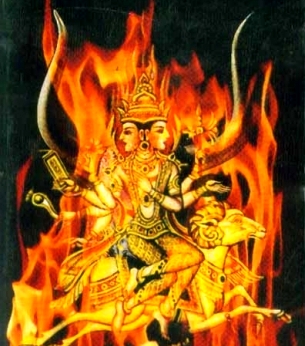Max Müller and the Indian Connection
TRANSCEND MEMBERS, 28 May 2018
Dr Ravi P Bhatia – TRANSCEND Media Service
28 May 2018 – Like Greek, Latin and Tamil, Sanskrit is also an ancient classical language with a rich source of ancient wisdom in texts such as Upanishads, Vedas, Mahabharata and countless other well-known works that reflect the culture, knowledge systems and society of India.
Although Sanskrit was basically confined to the Indian subcontinent, its epics and other philosophical texts were able to travel to China and Japan to the East and Persia (Iran), Greece and Europe by scholars and translators from Sanskrit to western languages.
Surprisingly, one person who translated several Sanskrit works into Persian was Dara Shikoh (1615-1659) the son of Emperor Shah Jahan. Being the eldest son, Dara was supposed to succeed Shah Jahan as the next Mughal emperor of Hindustan (India), but destiny had some other plans. His younger brother Aurangzeb who was an ambitious man had him killed and subsequently became the next Mughal emperor after Shah Jahan’s death.
Although Dara Shikoh received military training and was asked to command some forces, his mind was elsewhere as he was involved in the study of philosophy, culture, and Persian and Sanskrit languages. He tried to understand the relationship between Hinduism and Islam for which he studied the Upanishads (in Sanskrit language). Subsequently in 1657 he translated the Upanishads and some other texts into Persian language (the court language of the Moghuls).
It was these translations that were subsequently re-translated into European languages including Latin, French and German languages. Many European scholars such as Arthur Schopenhauer (1788-1860) and others were able to have access to some of the Sanskrit epics through these translations and were greatly influenced by them. This aspect is clear from Schopenhauer’s works. Writing about the Upanishads he wrote:
“It is the most satisfying and elevating reading which is possible in the world; it has been the solace of my life and will be the solace of my death …”
Soren Kierkegaard a well-known Danish philosopher of the 19th century read some of Schopenhauer’s writings and to an extent this influence is reflected in his own work.
Another scholar who was influenced by the Sanskrit texts was Max Müller (1823-1900) who was a German philologist and scholar of Indic studies. He had studied in the Leipzig University and obtained his degree in philology in 1843. He was also interested in several languages such as Greek, Latin, Persian and Sanskrit.
Although he was a German, he spent a considerable period of his life in England and taught at Oxford University and was admired for his knowledge of classical Indian texts including the Upanishads and Vedas. He had access to several scholarly Sanskrit words that the East India Company had brought from India. To improve his knowledge of Sanskrit, he went to Paris to study Sanskrit under a French scholar.
Müller‘s love for and interest in Sanskrit was partly due to the fact that a relationship between Indo- European languages was beginning to be studied and analysed. Sanskrit being an old established language had influenced some of the European languages as could be seen from some common words. Another influence on Müller was Panini born approximately in 460 BCE who is considered to be the first Sanskrit grammarian, linguist, philologist and who worked in diverse areas such as phonetics and phonology. Moreover, apart from this architecture, Sanskrit was perhaps the best means of studying Indian culture in Europe.
In the later part of his career in England, he gave a series of lectures entitled ‘What can Indian culture teach us?’ at the University of Cambridge. Müller’s words bring a feeling of nostalgia even today. He said,
“If I were to look over the whole world to find out the country most richly endowed with all the wealth, power and beauty that nature can bestow, in some parts a very paradise on earth — I should point to India. If I were asked under what sky the human mind has most fully developed some of its choicest gifts, has most deeply pondered on the greatest problems of life and has found solutions to some of them which well deserve the attention even of those who have studied Plato and Kant — I should point to India.”
Müller wrote both scholarly and popular works on Indology, among them being the Sacred Boks of the East, a 50 volume set of English translations that were prepared under his direction.
Today Max Mueller Bhawan has been established in New Delhi for the study of German language and culture. An important road in New Delhi is also named after the famous scholar and Sanskrit lover.
To conclude this piece, I bring in the name of Thomas Alva Edison (1847-1931), a brilliant American inventor of the electric bulb and other gadgets including the phonogram or gramophone that could capture the voice of a person on the gadget and replay it later. After his invention, Edison wrote to Müller asking him if he could come and record his voice. On getting his permission Edison sailed for England and asked Mueller to record some of his words, which Müller did willingly.
Edison replayed the recording to a select group of persons who were familiar with the scholar. After listening to the recording the audience was asked if they understood what Müller had dictated. People fell silent because it was in a language that they were not familiar with.
Müller explained what he had dictated to the gramophone was the first shloka of Sanskrit text Rigveda. The audience clapped. The shloka was the tribute to Agni (fire) that paid homage to it in the following words:
“Agni you are the gleam in darkness and to you we come day by day with devotion and homage…”
_________________________________________________
Dr Ravi P Bhatia is a member of the TRANSCEND Network for Peace, Development and Environment, an educationist, Gandhian scholar and peace researcher. Retired professor, Delhi University. ravipbhatia@gmail.com
This article originally appeared on Transcend Media Service (TMS) on 28 May 2018.
Anticopyright: Editorials and articles originated on TMS may be freely reprinted, disseminated, translated and used as background material, provided an acknowledgement and link to the source, TMS: Max Müller and the Indian Connection, is included. Thank you.
If you enjoyed this article, please donate to TMS to join the growing list of TMS Supporters.

This work is licensed under a CC BY-NC 4.0 License.

